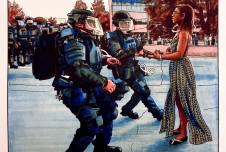My skin started prickling the instant the postal worker asked if I was related to another Koh family, after glancing at the return address on the envelope I handed him to weigh. When I didn’t respond—taken aback by what felt like a crossed boundary—he pressed on, telling me he thought the family was “overeducated.”

My head filled with confrontational words I might say, replacing the cheerful mood I’d been in minutes earlier. But I stayed silent, wanting to just finish the transaction and leave. Then he asked me “Where are you from?,” the question that Asian Americans like me dread, topping it with the comment that addresses in Asian countries are a nightmare to process.
Stunned and eager to escape, I asked for a receipt, turned on my heel, and strode for the exit. Just as I was about to step outside, he threw out what felt to me like a final insult: “By the way, I’m trying to learn to like Korean BBQ.”
I returned home furious and in tears. I shared what happened with my husband and a friend. Their reactions validated that this person’s behavior was over the line. His comments called up pernicious stereotypes about Asian Americans—that we are the model minority seeking achievement, or the perpetual foreigner who will always be associated with our ancestral country, even if our family immigrated generations ago. What didn’t require confirmation was the awareness that I had been here before and that I wanted to scream.
Growing up, racism felt confusing to me because it wasn’t choosy. It could be delivered by strangers or people I knew, in any type of environment—for example, through graffiti on the door of our family convenience store in Jamaica Plain (a then-gritty neighborhood of Boston), or when teenagers hurled racial slurs and full soda cans at my mom and seven-year-old me in Belmont (an affluent suburb outside of Boston), or when my first-grade teacher humiliated me at circle time over my Korean middle name.
And though you might think my armor is impenetrable, after many microaggressions and racist experiences in 51 years of life, it’s unfortunately still possible to feel hurt and disempowered.
Over the following weeks, I felt conflicted. Part of me didn’t want to deal with the situation because wasn’t January already difficult enough? But after so many years of feeling silenced based on my gender and race, I knew I needed to do something.
And I had a feeling that the thing I needed to do would be incredibly hard.
I spent the first week and a half after the incident stewing in fury. I was angry that this happened in the neighborhood I have called home for the past 16 years. I felt bitter that I was already carrying the burden of insult and the ball was still in my court.
And then fate gave me a nudge. For my podcast Edit Your Life, I recorded an interview with Nilanjana Dasgupta, a University of Massachusetts, Amherst, social psychologist and author of Change the Wallpaper: Transforming Cultural Patterns to Build More Just Communities. I asked for her advice about the post office incident, noting that I did not want to go to management and risk getting this person fired. Dasgupta suggested direct communication. “Talk to the person directly or write to the person and say how you feel or how their actions made you feel. Feelings that are hurt rather than outraged, I think hit the heart of the recipient,” she advised.
Greater Good Chronicles
A series of essays by people trying to apply the science of a meaningful life to their daily lives.Over the following days, as Dasgupta’s advice simmered in my mind, I felt my anger roll into sadness. Though I know racism isn’t choosy, I felt disappointed that I had become complacent given the diversity of the streets around me. I felt resigned about the need to level up my armor in my neighborhood—unless I wanted to switch to a different post office.
My turning point emerged as I was assembling a care package for my college kid, which would need to be dropped at a post office. As I layered Valentine’s treats and my kid’s favorite homemade granola between layers of tissue paper, my emotional switch flipped to calm. I felt in my bones—not just at a rational or intellectual level—that in this particular circumstance amid these divisive times, I didn’t want to be outraged, I wanted to be compassionate. I didn’t want to make assumptions, I wanted to be open-minded.
My purpose was simple: to communicate that our words impact one another.
Part one of my mission was to not be afraid of the post office, in its simplest, functional sense, so I could mail my daughter’s care package. Part two of my mission was to embrace the post office as a reasonably safe container in which to have an awkward conversation. I took a deep breath and said to myself, “Hard times require courage,” and walked in.
A different employee, a Black woman, was at the counter. After we finished our transaction, I looked at my receipt from three weeks prior and asked if the clerk, listed by number, would be on shift later that day. He was, in fact, in the back.
The clerk, a white man, came out. I explained that I was there three weeks ago and that I left very upset based on what he said to me. I repeated back the comments that felt offensive. And my main message was this: Whether we’re online or in community with strangers or people we know, our words matter. I told him that I was there because I wanted him to know how his words made me feel, and to give him the opportunity to share where he was coming from.
He seemed to experience an emotional rollercoaster of his own, though on the scale of minutes, not weeks. At first, he seemed surprised; he stood up a little straighter and reared back slightly, eyes widening. Flustered, he said that how I interpreted his words was not his intent and he apologized quickly. Then he seemed defensive, sharing that he tries to be friendly and that if a return address said “Yastrzemski,” he would ask if the person was related to Carl Yastrzemski. He followed with, “Fine, next time I will just say ‘hi’ and ‘bye’ and that’s it.”
And then—perhaps because the other employee and a customer were bearing witness to this exchange—he seemed embarrassed. As I tried to say that I did, in fact, want our community to be able to chat and be friendly, he shut down. He wouldn’t look at me. His eyes were cast down, glued to the postal calculator device while his fingers punched at it, even though there was no weighing or measuring to be done other than the conversation between us.
I didn’t want to push it, so I thanked him for his time and left. The interaction wasn’t perfect—I wish I had closed by sharing first names, shaking hands, and saying, “Let’s move forward”—but hard moments are rarely perfect.
It occurred to me after I left that the big difference between what had just happened and so many racial incidents in my past was that I could be choosy. I chose to be brave. I chose to question my own assumptions. I chose to use my voice and invite someone into conversation. And though it might seem like a minor thing, because of these choices I don’t need to avoid this post office. I hope that small interactions in the future will lead to repair and a congenial relationship with this individual.
The small steps of resistance and change start right in our neighborhoods.







Comments